Missouri Senate grinds to a halt as Freedom Caucus pushes for action on ballot measures
In just the third week of the legislative session, the Missouri Freedom Caucus derailed Senate proceedings with a filibuster lasting more than eight hours as members sought immediate action to change the initiative petition process.
This came on the heels of the announcement that a group of abortion-rights advocates had begun their signature collection campaign to ask voters if they wanted to legalize abortion this year.
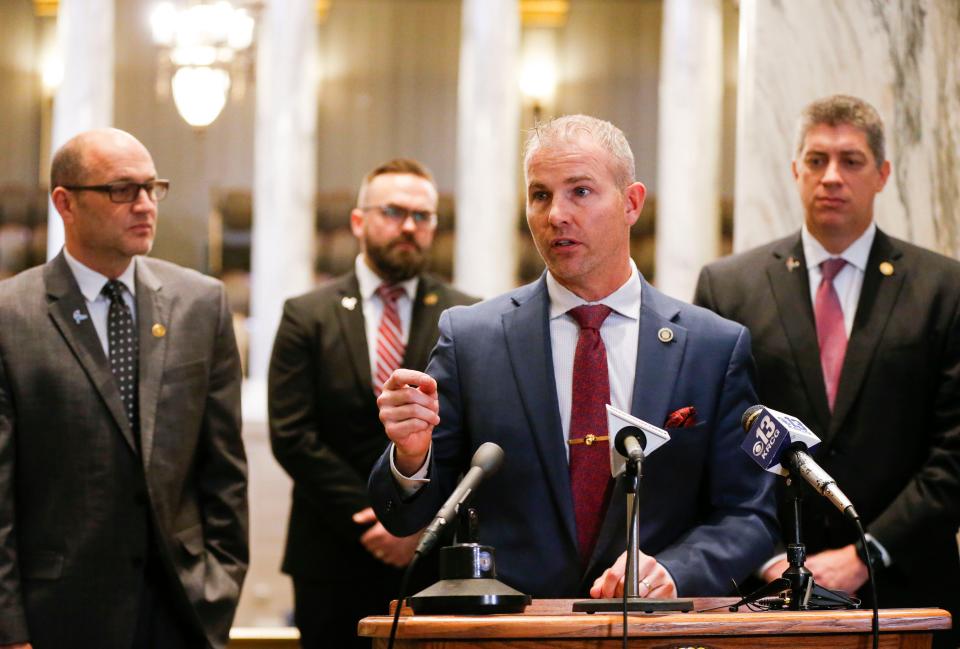
Freedom Caucus members asked Senate leadership to immediately hear legislation from state Sen. Jill Carter, a Republican representing Jasper and Newton Counties. They wanted this done in a Committee of the Whole, a rare move in which the entirety of the Senate would serve as one committee to hear the bill, then vote to pass it and send it to the Missouri House.
State Sen. Sandy Crawford, a Republican from Buffalo, raised concerns that doing so would rob the public of its opportunity to present comments on the legislation.
“I think we owe it to this institution to be transparent to have public hearings,” Crawford said.
Generally, Thursday Senate sessions end by the early afternoon, allowing lawmakers to return home to their families for the weekend. However, as the session began that day, the Missouri Freedom Caucus issued a press release indicating that they would be blocking all gubernatorial appointments until the Senate passed a bill making ballot initiatives harder to pass.
“Desperate times call for desperate leaders,” the release stated. “Either leadership cares about leading Missouri pursuant to Republican priorities like voters expect them to, or they do not. It is time for them to act accordingly.”
There were 25 people waiting to be confirmed Thursday to appointments in state jobs, college boards and local government. There are 16 more appointments scheduled to go through on Wednesday. Freedom Caucus members said that they will allow none of those appointments to be confirmed until their demands have been met.
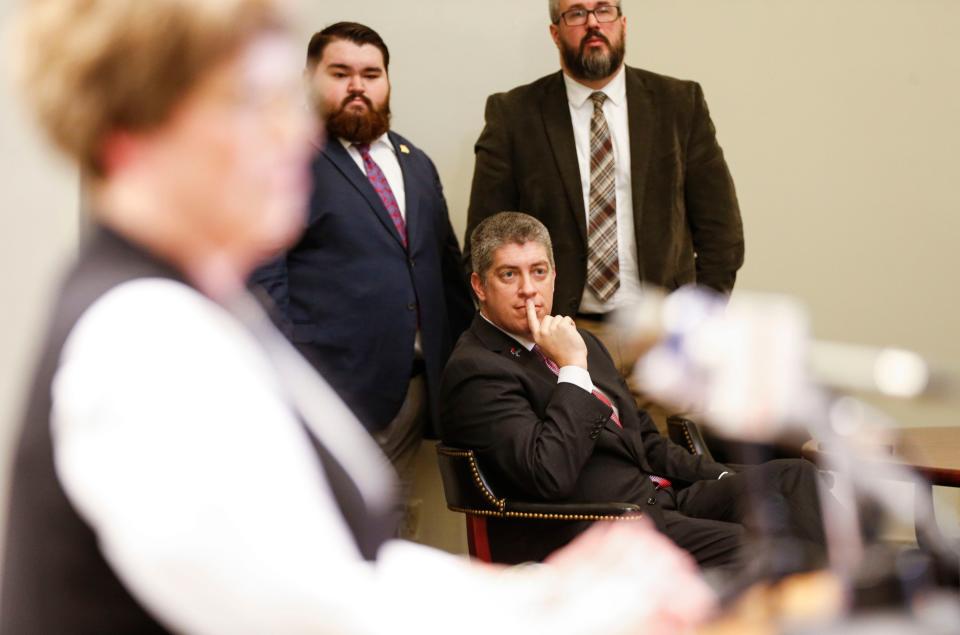
This flat refusal to find a compromise led to name calling between senators, with Senate Majority Leader Cindy O’Laughlin accusing state Sen. Bill Eigel, a founding member of the Freedom Caucus and Republican gubernatorial candidate, of using “terrorist tactics” to get his way.
“Do you know what the definition of narcissism is?” O’Laughlin said. “You are the definition.”
More: Ballot initiative process sure to be in GOP's crosshairs during legislature's 2024 session
How do lawmakers want to change the initiative petition process?
Overhauling the initiative petition process has been a legislative priority for many conservative lawmakers. In recent years, voters have passed Medicaid expansion, legalized both medicinal and recreational marijuana, and other issues the Republican majority in the legislature refused to approve.
During the 2023 legislative session, a bill increasing the requirement for passing a ballot initiative from a simple majority of the public vote to 57% approval failed to pass the finish line, as Senate filibusters in the final days of the session stymied progress.
More than 20 bills aimed at revising ballot initiatives were prefiled in December. There were varying suggestions to change initiative petitions in these bills, but most centered around requiring a majority of voters statewide and a majority of voters in each of the state’s eight congressional districts to approve a ballot initiative for it to pass.
This stems from a desire from some lawmakers to give rural voters a larger voice. Several of the recently passed initiatives succeeded based on the approval of voters in more populated urban and suburban areas. Despite receiving clear majorities of the statewide vote, they would have failed if an affirmative vote in the majority of congressional districts was required.
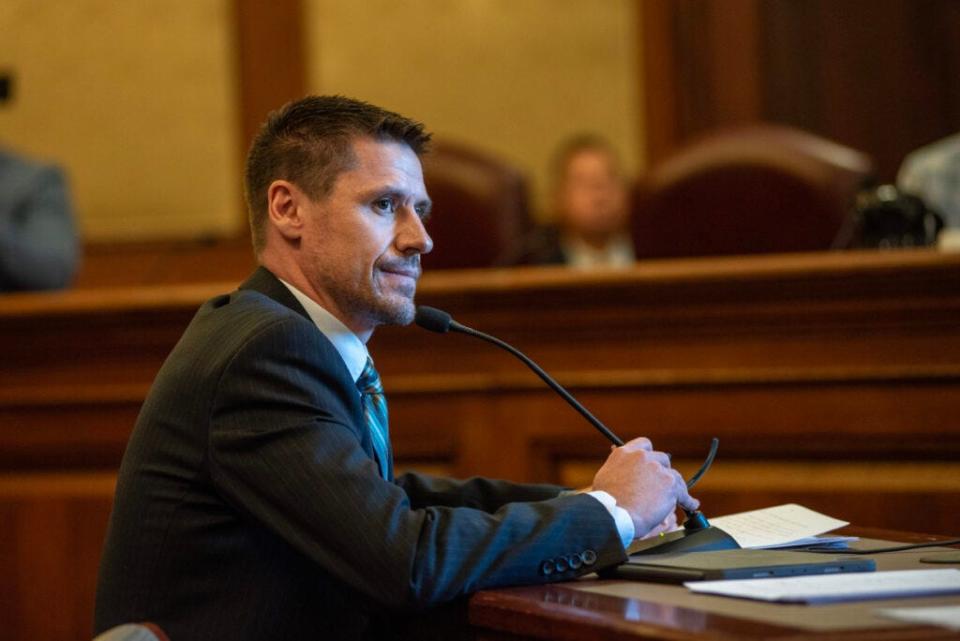
State Sen. Andrew Koenig, R-Manchester, feels that the state’s initiative petition process undermines the republican form of government laid out in the U.S. Constitution by enabling direct democracy in the state.
“The U.S. Constitution does guarantee a republican form of government,” Koenig said. “And obviously the IP process does subvert that a little bit. It looks a little more like direct democracy.”
However, others feel that imposing new standards violates the principle of “one person, one vote” that underlies the nation’s democratic foundations. Although Missouri Senate Democrats remained rather mum during the exchanges on the Senate floor, a post on X revealed their thoughts about this idea.
Republicans on the Senate floor just said the reason they want to get rid of Missouri’s Initiative Petition process is b/c the current process is a “direct democracy”
They are saying, INTO MICROPHONES, they want to get rid of Missouri’s ‘one person, one vote’ direct democracy.— Senate Democrats (@MoSenDems) January 18, 2024
Additionally, many lawmakers expressed concern about foreign influence and out-of-state money impacting ballot initiatives. So far, at least seven bills propose either restricting donations and sponsorship of petitions by foreign countries or enacting regulations on out-of-state donations or signature gatherers.
Any change to the initiative petition process lawmakers might approve would require a public vote before it could take effect, with the existing standard of a simple majority required for success.
Furthermore, with the prospect of an abortion rights petition making it to the ballot, conservative lawmakers have limited options to change the initiative petition process before that question could be placed on the ballot.
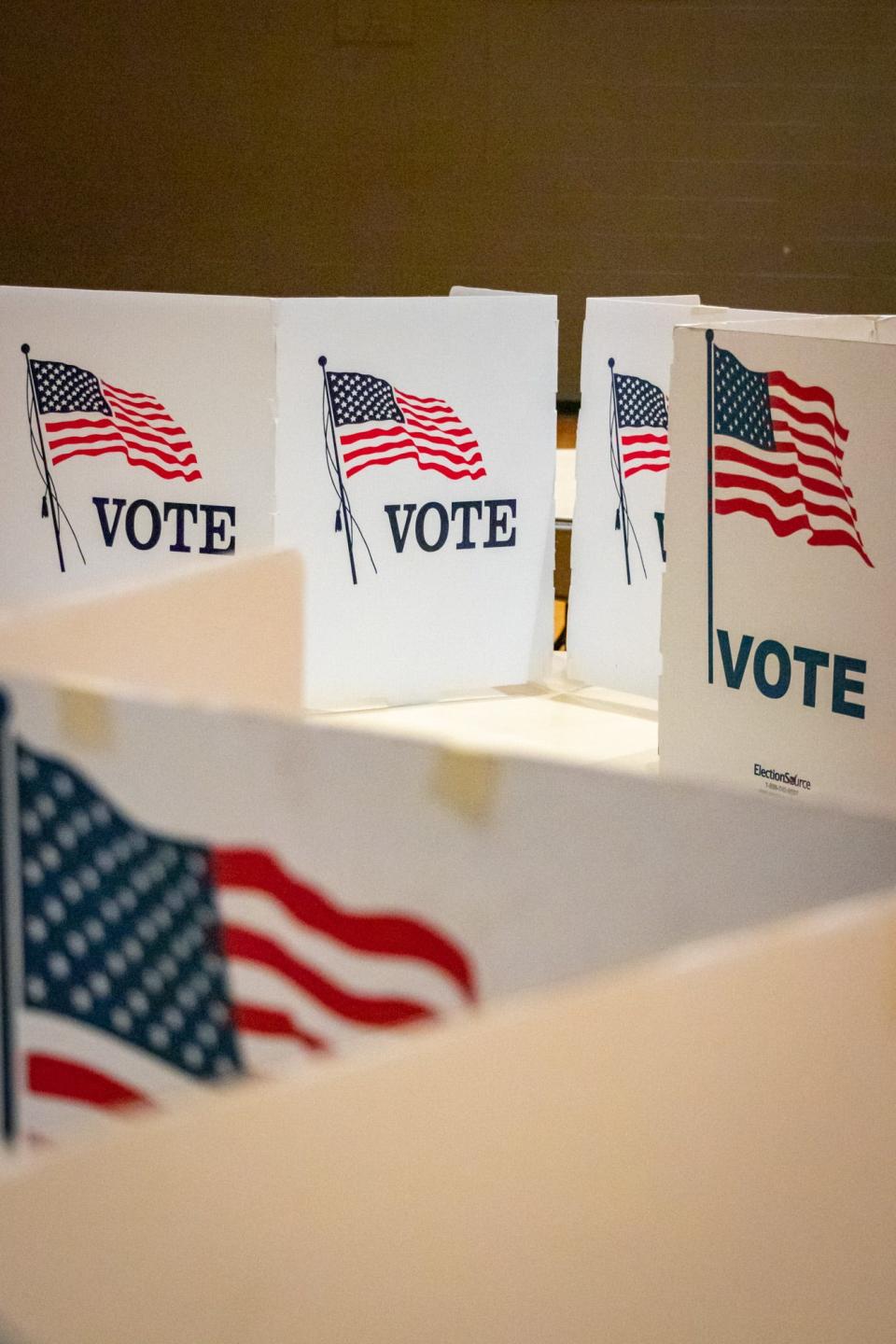
The governor’s office ultimately decides when an initiative petition will appear on the ballot. For a change to initiative petitions to impact the abortion rights issue, it would have to be passed during the August primary election, with the abortion question placed on the November ballot, provided it can gather enough signatures in time for inclusion.
However, this is a risky strategy for conservatives to employ. If the initiative petition question should fail to pass in August, then placing an abortion rights question on the November ballot could bolster Democratic voter turnout, risking victory in tightly contested races.
More: Initiative petitions came under fire in 2023. Experts forecast more of the same in 2024.
Conservative division on full display in the Missouri Senate
Although Republicans hold a supermajority in the state legislature and agree on their desire to alter the initiative petition process, Senate leadership refused to acquiesce to the tactics employed by members of the Freedom Caucus.
Senate President Pro Tem Caleb Rowden expressed his disappointment with these actions, which held up business as usual and delayed the approval of gubernatorial appointments because Freedom Caucus members “didn’t get their way.”
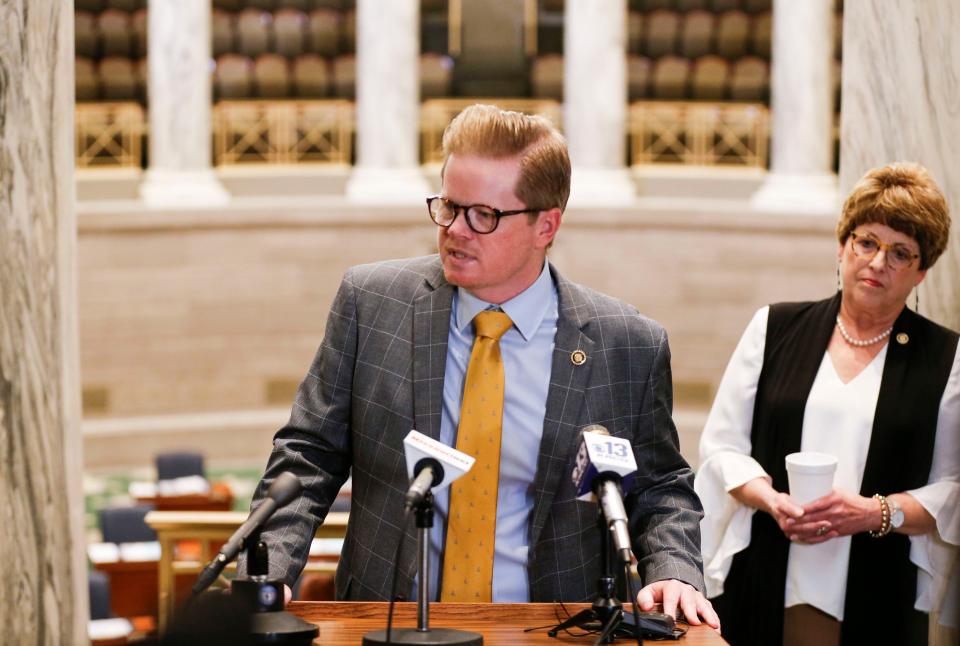
“I don’t know that I’ve ever been as disappointed in this chamber as I am right now,” Rowden replied. “This is unequivocally, without a doubt, the worst show of bad faith, or the biggest show of bad faith, I have ever seen in my life.”
Rowden offered a compromise early in the filibuster, promising to refer the legislation to committee first thing Monday morning. His offer was refused after Eigel pointed to a lack of trust in Rowden to follow through on his promise.
“I know what you want but what I don’t understand is how this gets you there,” Rowden said.
Rowden questioned how this extended filibuster would cause a committee chair to react when the legislation is referred to their committee. The chair is the one who decides whether a bill receives a committee hearing or a vote to proceed through the legislative process.
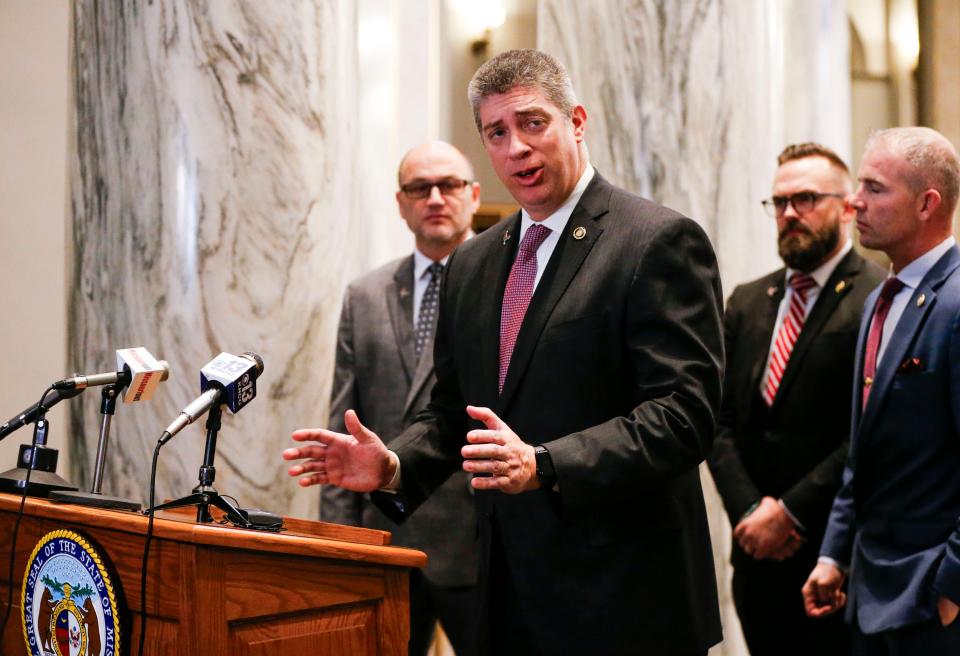
After a heated exchange between Eigel and O’Laughlin early in the day, Sen. Holly Thompson Rehder, who is running for lieutenant governor this year, tried to bring the matter into perspective through the words of the late Paul Harvey, who always tried to bring his radio listeners “the rest of the story.”
“As I sit here and listen to another day of charlatans, throwing smoke screens, I find that I'm very compelled to tell you the rest of the story,” Thompson Rehder said.
She recalled the events of the 2023 legislative session, in which legislative leaders crafted amendments to a bill containing high priorities for members of both chambers, like personal property tax cuts and sports betting. However, in the final days of session, she saw members refuse to compromise, killing legislation with their own priorities included.
“The people who are now up on this floor complaining about us not getting property tax cut down last year said, ‘No, we're not passing a bill with sports betting in it,’” Rehder said. “So they gave up everybody's property tax cut because they didn't want sports betting.”
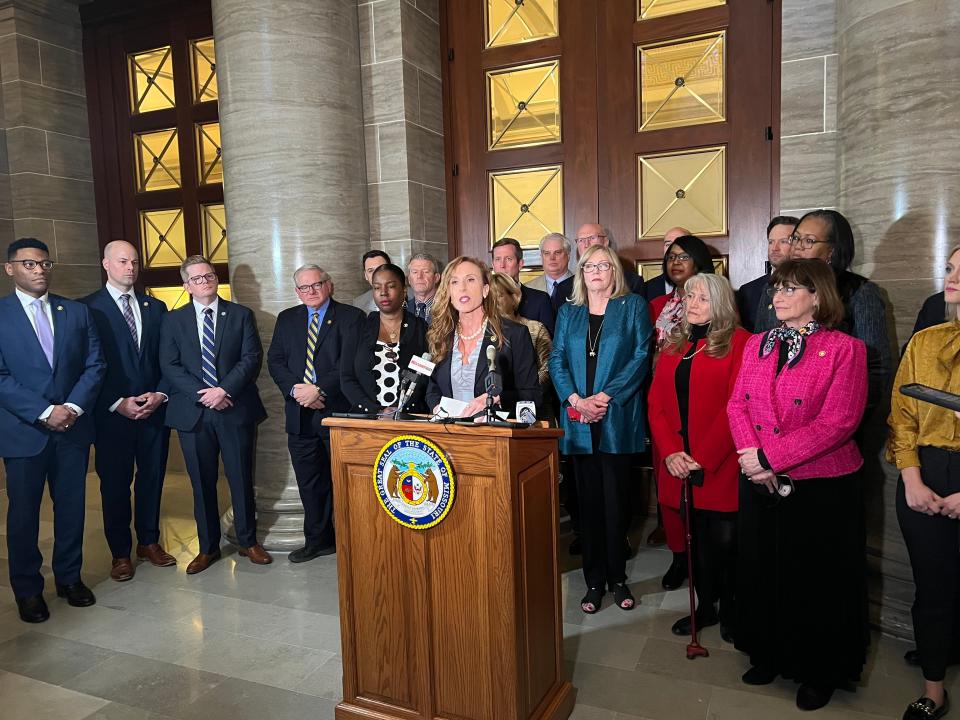
She said this latest stunt is another testament to the contrary nature of some senators who are more concerned about making speeches in a bid for attention on social media, especially when they get to attack fellow conservatives that they regard as “Republicans in name only,” or RINOs.
“Then you have the charlatans put on Facebook, ‘Well, the RINOs have voted with the Democrats again and voted us down,’” Thompson Rehder said. “No, sir, 15 Republicans voted against five who want to have their name in the paper 12 times a day.”
State Sen. Rick Brattin, chairman of the Missouri Freedom Caucus, said the tactics employed Thursday are not a stunt, but the only recourse left to them for ensuring that the initiative petition process is altered this year.
“Are we going to wait until the last flippin’ day as we see time and time and time again, where it falters and fails?” Brattin said.
This article originally appeared on Springfield News-Leader: Here's how Republican infighting halted Missouri Senate proceedings

